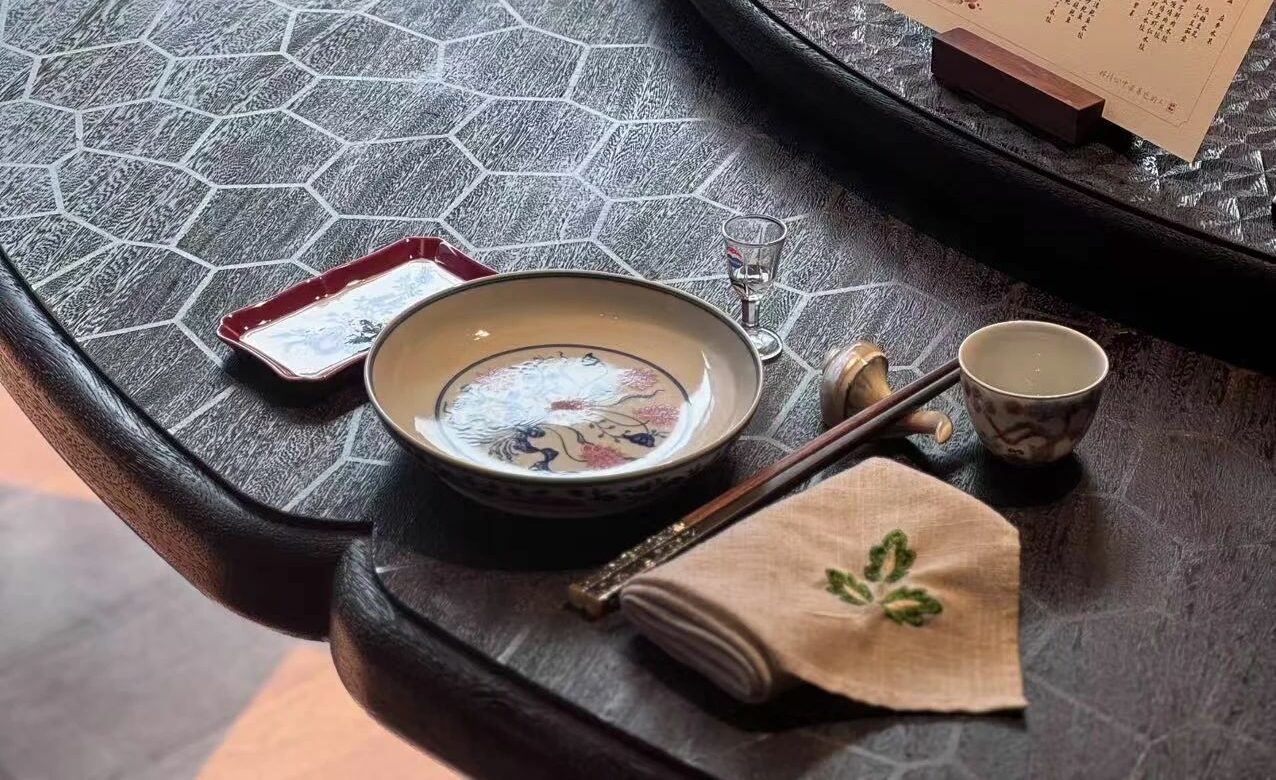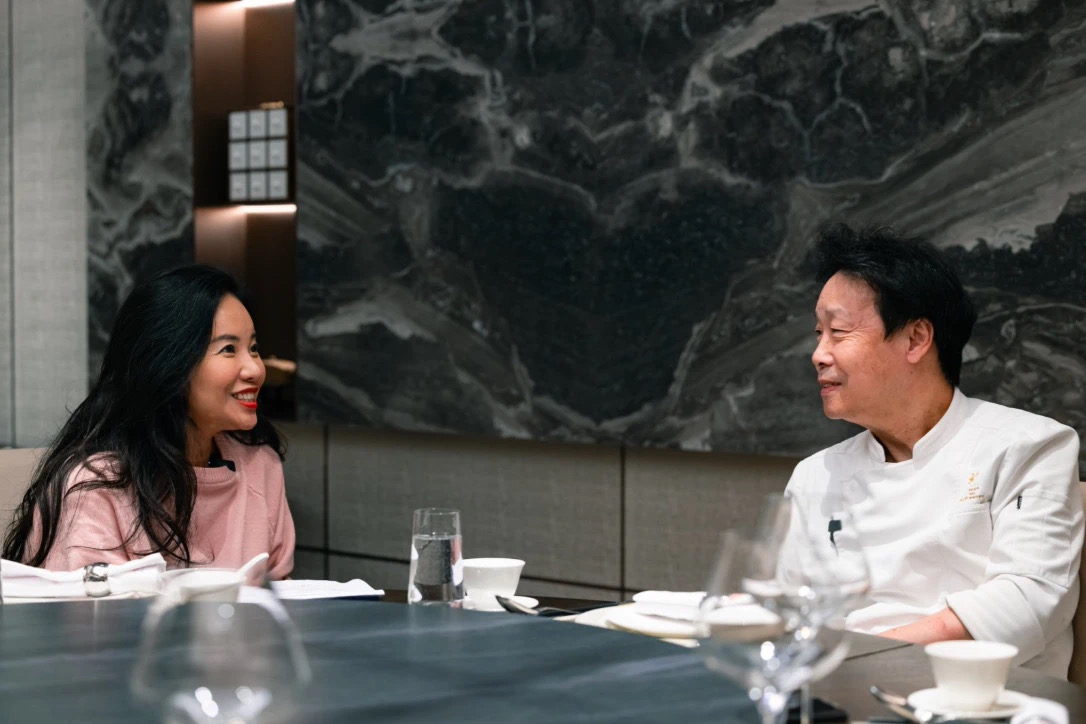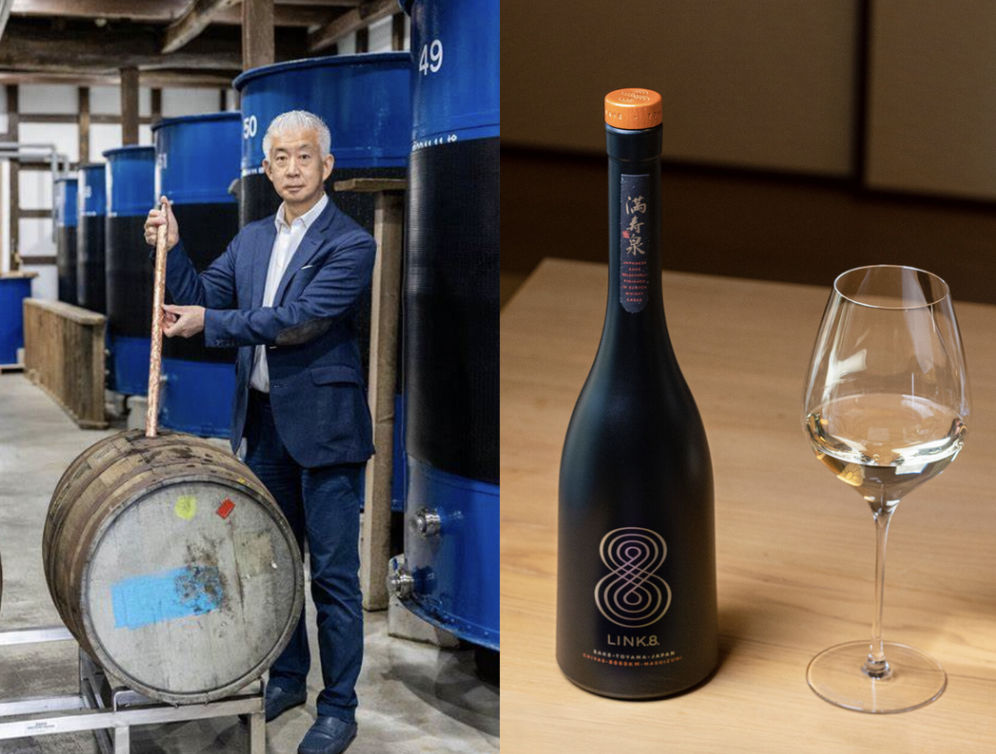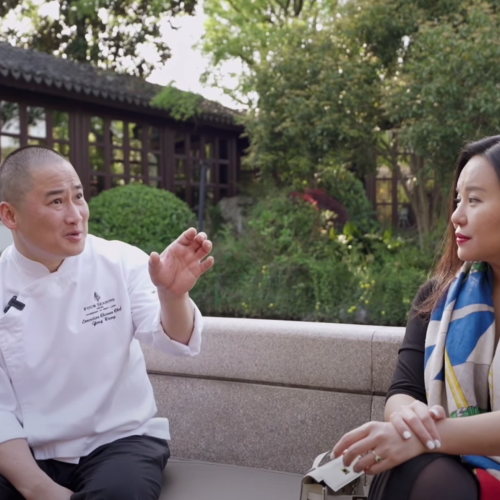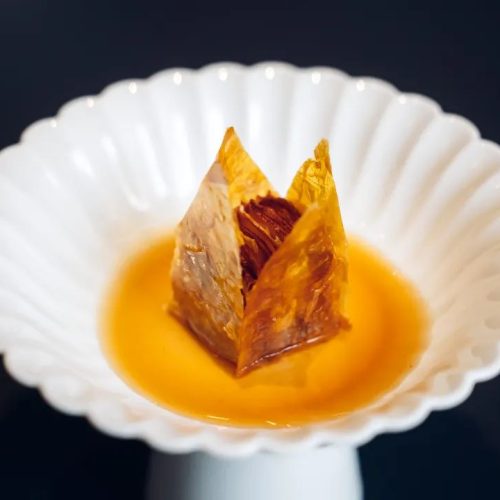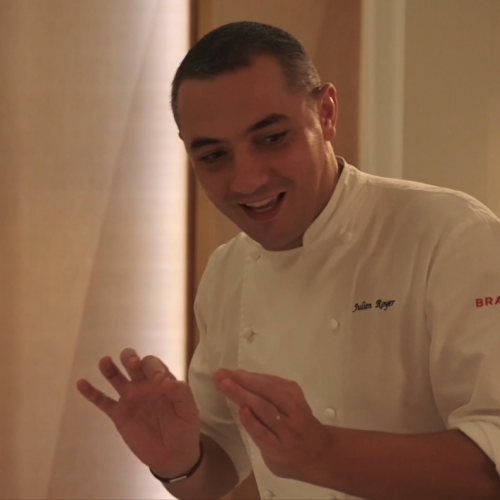Vastly diverse and exquisitely profound, Sichuanese cooking has been conquering the competitive catering market. But few have seen the pursuit of ultimate aesthetics and artisanal taste in traditional Sichuan cuisine to bring back the best food scene and nuanced preoccupation with life of the Song Dynasty. Zhou Ziling, one of the leading figures of Chengdu’s culinary scene, has done it. Resting on the best spot of Chengdu’s Luhu Lake, Ziling’s restaurant Silver Cottage is a Song-style painted pleasure barge that allows the modern world to travel back in time, to experience four arts of the Song Dynasty and Sichuan cuisine, and to wake up the explorational soul with a refreshed spirit and inner peace.
Owner of Silver Cottage and founder of Chengdu Yintan Catering in 2002, Zhou Ziling is a native of Chengdu and has committed herself to pursuing the ultimate in gastronomy. Starting with abalone hot pot, Ziling has 20-year experience in the restaurant trajectory and has been managing a total of nine restaurants including Yintan, Hidden Place and Silver Pot, as well as this year’s newly launched brand, Silver Cottage, with three more under construction.
Ziling is a restaurant group entrepreneur, but her elegant appearance may strike you as a distinguished countess in ancient painting. One year she was invited to attend TastyTrip’s Gastronomic Forum in Shanghai and I was instantly drawn by her graceful manner and refined beauty before I even got to know that she is the founder of Chengdu’s top-notch Sichuan cuisine.

Zhou Ziling, founder of Chengdu Yintan Catering, attended 2020 TastyTrip Gastronomic Forum
I remember watching an episode of the documentary Chef’s Table on a Michelin three-starred chef Dominique Crenn. In a male-dominated industry, Crenn was constantly reminded that her talent and techniques were often overshadowed by her identity as a female chef. It’s a sad stereotype but it’s true, and sometimes hard to resist, even for myself. Unlike most restaurateurs, Ziling is not a fan of socializing occasions; she likes working on her own. However, I admire her not only for her dedicated research but for her efforts in studying traditional Sichuan cuisine and oriental aesthetics.
Silver Cottage in Song
I already fell for Hidden Place the first time I visited it in Chengdu. This time I was invited to attend a Song Dynasty-themed dinner at Silver Cottage. I had seen the design of the restaurant and the construction site before the opening of Silver Cottage, but I was still in awe when I saw the final result in person. Comfortably tucked in the best location in Chengdu’s scenic artificial lake, Luhu Lake, the restaurant is a modern Chinese courtyard that provides a perfect hideaway from the hustle and bustle of the city life with winding paths leading to seclusion. Before entering the restaurant, guests will be provided with Song Dynasty costumes and a boat ride on the pristine waters of the lake to get a taste of the ancient lifestyle and explore the beauty, architecture and scenery of the surroundings. By incorporating Song people’s four main leisurely activities: tea-making, incense-burning, flower-arranging and indoor decor paintings into its exquisite oriental aesthetics, the restaurant offers a panoramic and immersive Song-style dining experience.
Inspired by the Green and Blue Landscape masterpiece of the Northern Song Dynasty – One Thousand Li of Rivers and Mountains, landscape designer Li Junli blends in a miniature version of the painting for the aesthetic of some of Silver Cottage’s private dining rooms. Besides, the Chinese furniture design classic Yan Ji Tu is also incorporated for its design philosophy as Li combines modern architectural aspects and literati-style aesthetic to transform Silver Cottage into an elegant realm of getaway where diners can enjoy a classic Sichuan banquet in the tranquil elegance of the Song Dynasty.
Tableware is tailormade to specifically recreate the atmosphere of a Song Dynasty feast. Ziling partners with Li Qing, the founder of Shushan Kiln, to perfect ceramics pattern design and manufacture, spending two years and over 300,000 yuan for the trial-and-error. Forgoing other less effective production methods including 3D printing, they eventually agreed on a relatively less mainstream ware used during the Song Dynasty – white porcelain. By adjusting ceramic powder compositions, they were able to increase the translucent beauty and the austere, ivory-white and warm-glazed vessel surface. Li Qing is a descendant of Genghis Khan and his works are often exhibited in European art museums. Using line patterns in his design to showcase the beauty of the Song Dynasty, Li has successfully developed outside of conventional practices, giving value to traditional art and innovation.




Interior Design of Silver Cottage
Ziling had her own quest for choosing the Song Dynasty as the theme of Silver Cottage, one being the obsession with elegance during the Song times, another being the chasing of continuous breakthrough. She mentioned that one of the most crucial influences on Chinese cuisine was the invention of the iron wok. It is believed that this simple utensil can give rise to qi, which connects and pervades everything in the world, including cooking.
Admittedly, the Song is a much-aspired dynasty, but Ziling wasn’t originally an expert in its history. She visited celebrated masters and studied classic literature to help build up a picture of the Song Dynasty from scratch. The Song Dynasty marks an important notch for Sichuan cuisine because during that time Sichuanese food travelled to the Central Plain of China and since became a national popular cuisine. The popularity of banqueting during the Song Dynasty also contributed to the flourishing of Sichuan cuisine.
But imitation is not what Ziling really wanted. Ethos is very much in the driving seat. As historian and poet Chen Yinque said:” Chinese culture has evolved over thousands of years and reached its zenith in the Song Dynasty. At that time, aesthetics and artistry were highly valued and to call it Chinese Renaissance would not be over-exaggerating. On the contrary, imitative behaviours in the modern times have made Song people’s innovative ethos even more precious.”
Silver Cottage is surely a Sichuan cuisine restaurant, but for Ziling, it is a culinary theatre where she is the Chu Niang (female chefs) and director, and Sichuan cuisine is only part of the story. Retro is not just about poetry. The thought of dressing up and changing clothes made me a little hesitant at first, but in the end, we had a great time in ancient costumes.
As Ziling said, guests at Silver Cottage were addressed by the reference names of Niang Zi (maidens) or Guan Ren (male masters), and were offered various leisure activities such as playing the guzheng, playing the xiao (bamboo flute), embroidering, making sweets and making tea. Often guests are having so much fun that the restaurant’s delicious dishes sometimes don’t receive due attention. In fact, the dishes are stunning results of Ziling’s years of research and hard work, with sophistication, character and Chinese craftsmanship, retaining ancient culinary culture and expressing national pride through the language of oriental aesthetics.

Left:Zhou Ziling, Founder of Chengdu Yintan Catering;
Right:Jocelyn Chen, Writer


Ancient Sichuanese Cuisine
Ziling consulted scholars in Song history to maximise authenticity. Su Dongpo-style dishes were originally the genre they decided on, after all, he was a great writer and food expert who loved cooking, and a native of Sichuan. During his lifetime, Su created a large number of popular gourmet dishes, but the problem is that they are perhaps too popular and somehow lack exquisite notes. Ziling later found out that Song people rarely ate pork, and Dongpo Pork was actually invented when Su was deported to Hainan, which is not in the best position to represent true Sichuan cuisine for the Song Dynasty. In addition, innovation stands in the forefront of Song people’s ethos, and therefore literati dishes should be brought into play to instil context and imagery while catering to the modern palate.
Ziling seeks expert opinions widely. She invited Sichuan cuisine master Peng Ziyu to design the menu of Hidden Place and sought tutorage under master Zhang Zhongyou for whiffing utmost aesthetic into the dishes. Besides, she has also searched for traces of traditional Sichuan cuisine in ancient recipe books for strong endorsement. That explains the deep trust Ziling has received from Chengdu’s restaurant industry.
Hard work and research have brought Silver Cottage’s cooking to new heights. Known for being a secret recipe among the versatile culinary world of Sichuan cuisine, the Butterfly Bamboo Fungus Soup here served at Sliver Cottage is passed on by master Zhang Zhongyou, who is a renowned Confucian chef. The cooking process involves several steps: from chopping the fungus, picking out the stems and fiber, to hand-carving the shape of a butterfly, and garnishing with flower juice, vegetable juice and sesame seeds. Even the “butterfly’s tentacles” made from shredded carrots vary in thickness, which shows how delicate, intricate and elaborate the work is. The “butterfly” will be finally served in a warm, healing cabbage-clear soup. A piece of art that takes seven to eight hours to craft.
The Plum Blossom Soup speaks of Song-style romance. White plum blossoms are hand-picked during the Great Cold (24th solar term), boiled together with melted ice dew and mixed with flour to make little pretty plum blossom-shaped pasta. Due to seasonal restrictions, Silver Cottage replaces plum blossom with rose petals and replicates the whole process, saluting Song-style elegance and delicacy.

Butterfly Bamboo Fungus Soup

Plum Blossom Soup
The Dry-Braised New Zealand Fish Maw boasts rich flavours and layered texture. New Zealand codfish maw is gently soaked all through and simmered in a chicken broth, before stir-fried with fresh mushrooms, diced pork and crunchy bamboo shoots. Then a pinch of Sichuan peppercorns is added and everything is braised until fully absorbing the sauce to bring out the tenderness, numbness and fragrance to hit all sense receptors in your mouth. Underneath the fish maw is a slice of wholemeal toast to absorb extra oil but it’s also tasty to eat.
The Hibiscus Snow Flake Chicken Velvet is a traditional fare for Bashu region, where chicken meat is finely mashed into cloud-like velvet, hailing the Sichuan molecular gastronomy. Silver Cottage has put an elegant twist on this ancient recipe by making the rice into cute “flower petals” to add complexity. Lin Jiazhi, an early-time pastry champion in Chengdu, passed on his exquisite skills in making rice dishes to Zhang Zhongyou. Today, Silver Cottage continues to take rice dishes to the next level, using rice and rose water to make hibiscus flowers to pair the cloud-white chicken velvet, paying tribute to the city flower of Chengdu – the hibiscus flower.
The Sichuan Pancake with Caviar is very similar to traditional pancakes but an interesting variation. Ziling said the conception of this dish began with her love for the pairing of caviar with soft-boiled eggs, whose runny texture strikes aresemblance to Sichuan’s traditional home-made pancakes. Topped with fragrant fish floss and gooey caramelized sugar, the dish is packed with flavour and texture. What’s more, guests will be served sake in ancient drinking vessels to complete the dining experience. Life in the Song Dynasty is perhaps something like this.
There’s a poetic beauty to everything that hits the table at Silver Cottage, including the final dessert, Moonset and Flower Dawn. Based on a painting by Lin Chun of the Southern Song Dynasty, Loquat and Mountain Birds, the dish uses loquats and lotus puffs to reproduce the scene on the plate, its subtle, delicious exuberance. You may find similar workmanship in Japanese Wagashi, but Silver Cottage has improved the formula to cater to its audience with reduced sweetness and layered stuffing.

Dry-Braised New Zealand Fish Maw

Hibiscus Snow Flake Chicken Velvet

Sichuan Pancake with Caviar

Moonset and Flower Dawn-Dessert Platter

Hot & Sour Shark Fin Soup

Sautéed Lotus Seeds with Lily Bulbs
The roots of Wagshi can be found in theSong Dynasty, and cultural elements of China’s Tang and Song dynasties quickly spread throughout Japan. So instead of going to Japan, Ziling reached for the origin. She described traditional Sichuan cuisine as having similar characteristics with the Song dynasty in that they both emphasise ingredients and techniques. The Song people knew their food, and they knew even better how to arrange simple ingredients into distinctive presentations that thrum with flavours. It’s safe to say that Silver Cottage is Ziling honouring the Song Dynasty.
A Dream of Zhuangzi
At the end of the dinner banquet, gentle music from a xiao-playing musician wafts through the drifting lake boat while visitors can experience ancient leisure activities of the literati, such as playing the guzheng and shadow dancing. This brings the Song banquet to an end, leaving you lingering upon its detailed service, unpretentious beauty and antique ambiance. The evening banquet at Silver Cottage is like a dream of a butterfly in Zhuangzi. I could wax poetic about the refined quaint feel of the dinner banquet and the vaguely Daoist inspiration for the cooking.


Ziling was not quite satisfied with the result as it does not provide accommodation, so the message she wished to convey could not be fully delivered in one day. Good news is that Ziling is having a new project on the Qingcheng Mountains that includes accommodation. Let’s keep the air of expectancy for it.
The Song Dynasty was a time when skilled Chu Niang were fashionable professions and very much revered by wealthy patrons and dignitaries for their strong competency and attractive appearance. Drawn to the aesthetics and innovative spirit of the Song Dynasty, Ziling embodies the Chu Niang character and is at the helm of creativity and R&D, the backbone of the restaurant, and a market pioneer.
I must admit my true admiration for Ziling’s insistence on perfection, research, as well as her superb execution power. Apart from Song banquets and Sichuan cuisine, Ziling has been optimising methods to best capture the unique citrus tang of Sichuan peppercorns, during which time she worked with a chemistry professor on preservation and extraction methods. Peppercornoil used at Silver Cottage is extracted in eight hours of harvesting for freshest result, or turned into an essential oil to echo the remarkable soul of Sichuan cuisine. I asked Ziling how she would cope with stress in difficult times. She said, over every mountain, there is a path, and all she did was to find it.
Ziling’s gushing enthusiasm and unwavering passion for the restaurant industry has seen the country’s stunningly beautiful feast robustly taking off. Even back in the Song Dynasty, aristocracy may not have been able to enjoy such a delicious, magnificent novelty.
Silver Cottage
📍Luke Island (in the Luhu Tianfu Food Island), Section 1, Tianfu Avenue, Shuangliu District, Chengdu
⏰Mon – Sun 11:00-21:00
☎ TEL:028-63286688




